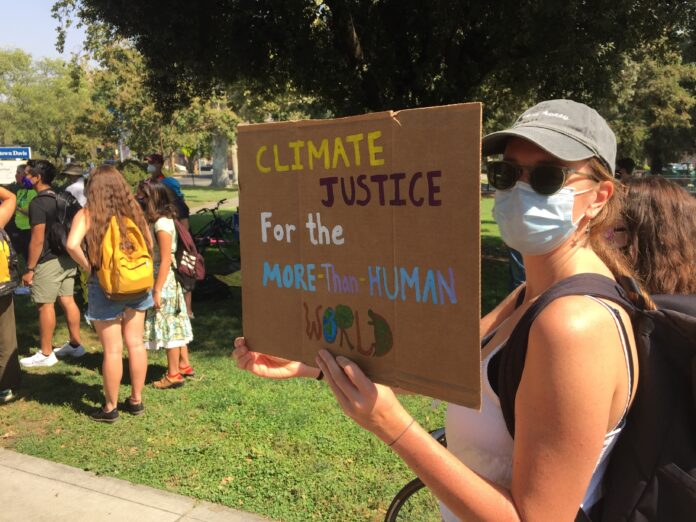This plan is a big step forward for UC Davis, following a series of other actions and efforts to reduce on-campus emissions
By SHRADDHA JHINGAN — city@theaggie.org
In a meeting held on Jan. 4, Chancellor Gary May directed staff to create a plan to eliminate the use of fossil fuels at UC Davis by the end of the year. This decision comes after members of the Davis community had signed a petition encouraging UC Davis to end the use of fossil fuels as an energy source by 2030.
Stephen Wheeler, a professor in the department of Human Ecology and who is also involved with Fossil Free UCD, the organization behind the campaign and petition, said that this new step forward will also “help lead all the UCs” and could make UC Davis the first college to completely end the use of fossil fuels.
The Fossil Free UCD’s FAQ page provides a background into how the approach to fossil fuels within the UC system has evolved over the years. According to the website, UC campuses were required “to reach 2000 GHG emissions levels by 2014, 1990 levels by 2020, and carbon neutrality eventually at an unspecified date.”
Then in 2013, Janet Napolitano, the UC President at the time, announced the Carbon Neutrality Initiative, which means that UC campuses committed to emitting a net zero of greenhouse gasses by 2025. For UC Davis, this process has been staged in “scopes”.
Scope 1 emissions refer to “direct emissions from a source owned or controlled by an organization,” which at UC Davis are those from “campus operations,” according to UC Davis. Scope 2 however “are indirect emissions from sources that are owned or controlled by an organization’ for UC Davis these are purchased utilities, primarily electricity.” Lastly, Scope 3 emissions refer to “emissions from sources not owned or directly controlled by the university but related to campus activities.”
This was followed by faculty across all UC campuses voting to request UC Regents to end investments in fossil fuels, known as fossil fuel divestment, which the UC Chief Investment Officer approved.
As of 2020, $215 billion in investments were fossil free, however in order to meet the Carbon Neutrality Initiative goal by 2025, UC campuses would have to depend heavily on carbon offsets. Thus, climate activists aimed to completely end the use of fossil fuels across the UC campuses.
The meeting held on Jan. 4 represents the most recent development in this process and is a major step forward for reducing greenhouse gasses and their effect on the environment. There were previously other actions taken as well to work towards this goal. For example, in 2020 3,375 staff, faculty and students across the UC campuses signed a petition, with endorsement “by two major unions representing 50,000 staff” and “sponsored by Green New Deal,” known as the UC Energy Systems Petition, according to the FAQ page.
Stephanie Holden, a psychology Ph.D. student and member of Green New Deal, San Diego explained in a video that “we’ve experienced about 2 degrees Fahrenheit of Global Heating since the Industrial Revolution began.”
In a presentation by Fossil Free UCD held on Dec. 15, 2021, members of the organization noted that “our group today represents a much larger collaboration of students, faculty, staff, alumni, and researchers who want to see UCD play a global leadership role by ending its GHG emissions.”
In that presentation, they also noted that the UC system has been focusing on the 2013 Carbon Neutrality Initiative (CNI). This is not a viable solution however because “carbon neutral is not as good as fossil free. On-campus emissions are not going down at any UC. The CNI depends on carbon offsets after 2025.”
Wheeler noted that other universities such as Stanford University are “ahead.” Stanford for instance aimed to use 100% renewable electricity in the form of solar power by 2021. UC Davis however is also making huge strides in this aspect.
In another Fossil Free UCD meeting held on Jan. 18, they debriefed on the meeting with the Chancellor and further discussed “climate efforts” at UC Davis.
The presentation notes that “Davis has made progress in reducing Davis campus emissions[…], but heating and cooling emissions (from gas) remain high, as do Sacramento campus emissions.” However, UC Davis has made great progress in buying cleaner electricity.
Wheeler said that an Advisory Sustainability Task Force was recently formed and will “oversee the planning process.” It is led by Director of Sustainability Camille Kirk and Jim Carroll, the associate vice chancellor who handles design and construction management.
Ultimately, the plan that will be developed by the end of 2022 will not only provide the details for “a road map for ending fossil fuel use,” the presentation said, but will also be a major advancement for combating climate change at UC Davis.
Written by: Shraddha Jhingan — city@theaggie.org





